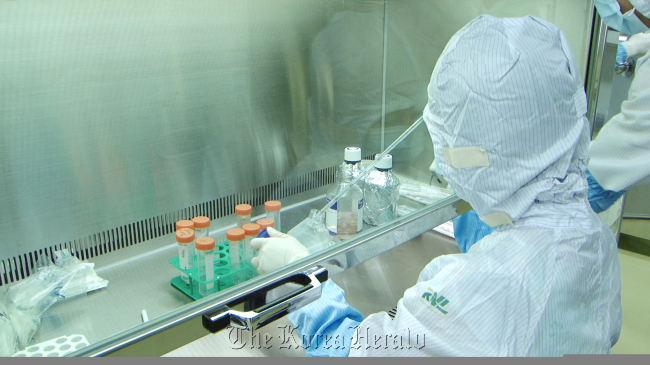The Ministry of Health and Welfare and RNL Bio Co., a Seoul-based bio venture, are locking horns over controversial stem cell operations on Korean patients in Japan and China arranged by the firm.
The government is considering taking legal action against the stem cell developer for a violation of Korean pharmaceutical law that bans injections of manufactured stem cells without approval from the state-run drug agency.
Officials claim the firm has evaded the Korean law because it administered stem cell injections at its partner hospitals in Japan where the procedures are allowed. So far, the ministry has sued the company for minor cases such as running advertorials in local newspapers to appeal that their treatment methods in use of stem cells has proved its effectiveness.
 |
This file photo shows RNL Bio scientists manufacturing stem cells at the firm’s lab in Seoul. (RNL Bio) |
RNL defended its overseas operations, saying it intended not to gain profits but to save patients from suffering.
“Because of the local law, we can’t help but send patients overseas to administer stem cell injections,” Park Hye-rim, a publicist for the firm, told The Korea Herald.
Park expressed disappointment that it takes more than seven years to obtain safety approval from the drug agency ― too long for patients who sometimes have only a few days to live.
It is a legal and common medical procedure for doctors to take stem cells from a patient’s fat tissue or placenta and inject them directly into the patient.
However, to maximize the treatment effect, the number of stem cells needs to be increased by 20- to 50-fold in the laboratory.
Due to safety issues, the laboratory formulation is only allowed when it is conducted for Korean Food and Drug Administration-approved research purposes.
“Patients have high hopes of being cured or to live. We just can’t turn down their desperate will to live and wait until we get approval from the drug agency,” she said, adding that their laboratory formulation of stem cells has proven its efficacy in thousands of patients and trials.
The stem cell drugs developed by RNL are currently under clinical trial, which is needed to prove a treatment’s safety and efficacy. But it will take many more years because every drug developed for a different disease needs to be tested separately.
The Health Ministry, on the other hand, said seven years was not that long for testing the safety of stem cell drugs compared to other products that require more than 15 years of clinical trials. The sale of drugs that are still being clinically trialed is also illegal, officials added. The stem cell therapy at RNL Bio costs between 10 million won ($9,400) and 30 million won, according to reports.
The dispute over stem cell injections deepened after a Japanese newspaper last month reported on a dermatology clinic in Fukuoka administering stem cell injections to hundreds of Korean patients a month.
About 500 patients a month were injected with manufactured stem cells in hospitals without approval in Korea, by a Seoul-based bio venture RNL Bio Co., according to the report by Mainichi Shinmun. About 3,700 Korean patients have received the treatments in hospitals in Japan since 2009 and about 11,500 patients in China, it quoted RNL officials as saying.
RNL Bio claimed that the Korean restrictions on stem cell procedures were too strict compared to countries such as Japan and the United States.
“Other countries are allowing stem cell treatments if they have proven safety and efficacy without running years of clinical trials on individual cases,” the firm said in a statement.
“Korea needs to establish a new legal framework that offers a chance to patients suffering from diseases that have no cure. We are calling for a limited approval for the government to not only save patients but also to help Korean (bio ventures) get international recognition for their advanced technique on stem cell research,” it added.
By Cho Chung-un (
christory@heraldcorp.com)







![[Today’s K-pop] Blackpink’s Jennie, Lisa invited to Coachella as solo acts](http://res.heraldm.com/phpwas/restmb_idxmake.php?idx=644&simg=/content/image/2024/11/21/20241121050099_0.jpg)
